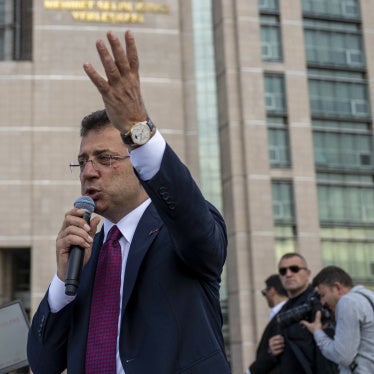(Dakar) - Nigeria's acting president, Goodluck Jonathan, should take immediate and concrete steps to address large-scale violence, endemic corruption, a lack of accountability for abuses, and other pressing human rights problems in Nigeria, Human Rights Watch said in a letter to the newly mandated leader. On February 9, 2010, the National Assembly voted to name Jonathan acting president, taking over from the ailing president, Umaru Yar'Adua, who has been hospitalized in Saudi Arabia since November 23, 2009.
In his address to the nation following the National Assembly's vote, Jonathan pledged to take on the prevailing "culture of impunity" that has fueled successive deadly outbreaks of inter-communal violence, tackle government corruption "more robustly," empower a rights-respecting police force, consolidate efforts to end the Niger Delta conflict, and follow through on electoral reform ahead of Nigeria's 2011 general elections.
"Goodluck Jonathan made positive and encouraging statements," said Corinne Dufka, senior West Africa researcher at Human Rights Watch. "Now the acting president needs to follow up with concrete actions."
The removal, on February 10, of Michael Aondoakaa, the justice minister and attorney general under whose watch the culture of impunity flourished, was an important first step, Human Rights Watch said. Jonathan should continue this positive momentum by taking concrete actions to make sure that those who commit abuses are held accountable.
In its letter to the acting president, Human Rights Watch called on Jonathan to address the problem of impunity by ensuring that the police conduct a prompt and thorough criminal investigation, with prosecutions, into the January deadly outbreak of sectarian violence in Jos and massacre of at least 150 people in nearby Kuru Karama. He should address the root causes of the violence by sponsoring legislation that bans all forms of discrimination against "non-indigenes."
The acting president should hold accountable security forces, notably the Nigeria Police Force, for widespread abuses, including extrajudicial killings, torture, and extortion, Human Rights Watch said. This should include a comprehensive criminal investigation into the extrajudicial killings by the police of suspected Boko Haram members in July 2009 and the unlawful killings of more than 130 people by the police and military while responding to the November 2008 sectarian clashes in Jos.
Jonathan should also "more robustly" tackle government corruption by subjecting government expenditures to greater oversight and more transparent financial audits, by calling on the National Assembly to pass the Freedom of Information bill, and by ensuring that government officials implicated in the massive looting of the state treasury are investigated and prosecuted, regardless of how highly placed.
Human Rights Watch further called on Jonathan to tackle the corruption and political violence that underlie the Niger Delta conflict by investigating and prosecuting the politicians who have embezzled and mismanaged the region's vast oil wealth and armed many of the criminal gangs active in the Niger Delta.
On electoral reform, Human Right Watch called on Jonathan to start to restore confidence in Nigeria's electoral system by dismissing Maurice Iwu, the chair of the electoral commission, and ordering a comprehensive and impartial investigation into widespread election abuses committed during and since the 2007 elections.
"Nigerians have suffered from violence, corruption, and state-sponsored abuses for far too long," Dufka said. "Goodluck Jonathan has promised to create a new era of rights and justice for Nigerians, and there is no time to waste."






